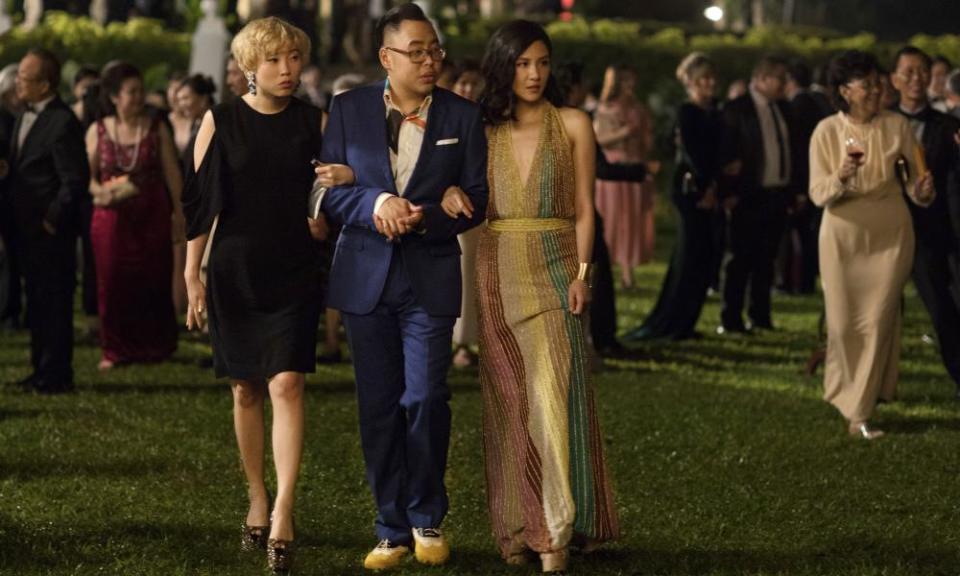Where are the brown people? Crazy Rich Asians draws tepid response in Singapore

It has been heralded as a milestone for representation of Asian people on screen, the first Hollywood blockbuster to feature an all-Asian cast in 25 years.
But Crazy Rich Asians, which raked in $26.5m (£21m) at the US box office over the weekend, has proved polarising among the community it is supposed to represent, many of whom have said it perpetuates racist stereotypes and presents a single version of Asia that is “palatable” for Hollywood audiences.
The film, set in the opulent world of Asia’s hyper-wealthy in Singapore, is an adaptation of a popular book by Kevin Kwan. The story follows a New York University professor who flies to Singapore to meet her boyfriend’s family, only to discover they own one of Asia’s largest fortunes. A whirlwind of wealth, champagne, extravagant parties and designer handbags follows.
The film has been praised by critics, both for challenging the norms of Hollywood, where Asian characters are few and far between, and often played by a non-Asian actor, but also for being a highly enjoyable “glimpse through the curtains at an intensely insular world, the 1% of the 1%”.

But some viewers in Singapore and across Asia disagree. In a two-part takedown of the film, Sangeetha Thanapal, an activist and writer of Singapore-Indian origin whose work explores Chinese privilege, said the film “simply is not the ‘Great Asian Hope’ that it is being portrayed as”.
“While it is being billed as an Asian movie, it is made up almost entirely of east Asians,” said Thanapal. “The few brown people featured in it are seen in service positions to the glamorous and wealthy Chinese characters. The dominance of east Asia in the worldwide imagination of who constitutes the idea of Asia is troubling, especially since brown Asians make up a sizable portion of the continent.”
A key criticism of the film is that it entirely erases the 15% of those in Singapore who are Malay and the 6.6% who are Indian. “Brown Asians have been overlooked from the American definition of Asian for generations,” Thanapal said.
The journalist Cat Wang pointed out that in the context of Singapore, the film “renders minorities invisible”.
“The movie perpetuates the misguided view that to be Asian means to be Chinese,” she wrote. “So while critics and starstruck fans have hailed Crazy Rich Asians as a decisive victory for Asians everywhere, in reality, such an assessment is simplistic at its very best and destructive at its very worst.”
Another journalist, Kirsten Han, said it was significant that the story was based around a specific type of Asian community – super-rich, ultra-glamorous, and extremely westernised. “Would the white Hollywood executives who backed the film have done so if it hadn’t been about over-the-top Asian wealth?” questioned Han.
A review of the film by a Singaporean film critic was equally scathing. “The main cast also comprises non-Singaporean actors who mostly speak in western accents,” he said, alluding to vetoed attempts by local members of the cast to include more “Singlish”, a form of local patois.
The film still does not have a release date in China, but international Chinese audiences have not all warmed to it either. Writing on the popular Chinese review site Douban, one reviewer said: “My [American-born Chinese] friends loved the film, but my Chinese friends really hated it.”
Another wrote: “Starring all Asian faces is really not easy in Hollywood. Still, I felt uncomfortable. The revival of Chinese culture doesn’t mean telling a Chinese story in a western way.”
But the film’s director, John M Chu, said the film would never be able to live up to all the expectations placed on it. “We decided very early on that this is not the movie to solve all representation issues,” he said in a press conference. “This is a very specific movie, we have a very specific world, very specific characters. This is not going to solve everything.”

 Yahoo Movies
Yahoo Movies 
